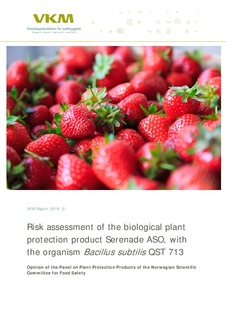Risk assessment of the biological plant protection product Serenade ASO, with the organism Bacillus subtilis QST 713. Opinion of the Panel on Plant Protection Products of the Norwegian Scientific Committee for Food Safety
Källqvist, Torsten; Dirven, Hubert; Gjøen, Tor; Tronsmo, Arne; Yazdankhah, Siamak Pour; Rivedal, Edgar; Borgå, Katrine; Eklo, Ole Martin; Grung, Merete; Lyche, Jan Ludvig; Låg, Marit; Nilsen, Asbjørn Magne; Sverdrup, Line Emilie
Research report
Published version
Permanent lenke
http://hdl.handle.net/11250/2463241Utgivelsesdato
2016Metadata
Vis full innførselSamlinger
Sammendrag
Bacillus subtilis are gram-positive bacteria that occur globally in soil, water, air, and decomposing plant material. The Bacillus bacteria are responsive to genetic alterations, and a large number of bacteria strains are part of the Bacillus genus. Some of the Bacillus bacteria strains have acquired genes for pathogenic toxins, but available techniques exist to identify and discriminate between the different strains.
Bacillus subtilis has been used for industrial enzyme and food production, and even as a probiotic to treat gastro intestinal tract symptoms and disorders, including diarrhoea in infants and young children.
Bacillus subtilis has been shown to act fungistatic and fungitoxic following contact with fungal pathogens at leaf or root surfaces, and may therefore be used as a biological fungicide in different crops. The Norwegian Scientific Committee for Food Safety (Vitenskapskomiteen for mattrygghet, VKM) has been asked by The Norwegian Agency for Food safety to assess the health and environment related aspects related to the use of the plant protection product Serenade ASO, containing the active ingredient Bacillus subtilis QST 713.
VKM has considered the data presented for the Bacillus subtilus strain QST713, and shares the opinion of EFSA, and also US Environmental Protection Agency, in that Bacillus subtilis “is considered a benign organism as it does not possess traits that cause disease. It is not considered pathogenic or toxigenic to humans, animals, or plants.” Bacillus subtilis is ubiquitously present in water, air and soil, also in Norway, and subject to competition by other indigenous microorganisms. Thus, the number of introduced Bacillus subtilis will rapidly decline and reach a natural equilibrium in nature. Bacillus subtilis show low or acceptable toxicity in terrestrial and aquatic non-target organisms. Effects on nontarget micro-organisms cannot be excluded, but are not expected to adversely affect natural microbial communities.
The possible risk related to Bacillus subtilis is linked to the possibility of miss-identifying a toxic Bacillus strain such as Bacillus anthracis or Bacillus cereus for Bacillus subtilis. Thus, VKM emphasizes the importance of product control, to ensure and document the identity, purity and relevant contents and property of each product batch prior to marketing and use.
Bacillus subtilis is not known to produce toxins, but produce proteolytic enzymes considered to be responsible for effects observed in inhalation experiments. Thus, proper preventive equipment should be used.
